Daily Vocabulary Words: List of Daily Used Words in Leading Indian Newspapers
Hi there. Welcome to this special section @ Wordpandit. Our endeavour here is straightforward: highlighting daily vocabulary words that you would come across in leading newspapers in the country. We have included the following newspapers in our selection:
• The Times of India
• The Economic Times
• Hindustan Times
• Mint
• Indian Express
We are putting in extensive work to develop your vocabulary. All you have to do is be regular with this section and check out this post daily. This is your repository of commonly used words; essentially, we are posting a list of daily used words. Hence, this has significant practical application as it teaches you words that are commonly used in leading publications mentioned above.
Visit the website daily to learn words from leading Indian newspapers.
WORD-1: Periphery
CONTEXT: Moitra’s expulsion serves as a catalyst for understanding politics through the lens of vernacular languages, challenging the established norms that relegate them to the periphery.
SOURCE: Indian Express
EXPLANATORY PARAGRAPH: Imagine you have a big circle drawn on a piece of paper. The line around the circle, the very edge, is called the periphery. It’s not the center but the part all the way around the outside.
MEANING: The outer limits or edge of an area or object (noun).
PRONUNCIATION: puh-RIF-uh-ree
SYNONYMS: Edge, Boundary, Border, Margin, Fringe
USAGE EXAMPLES:
1. The house was located on the periphery of the town.
2. He noticed a figure moving in the periphery of his vision.
3. The small shops are on the periphery of the shopping mall.
4. They lived in a village on the periphery of the forest.
WORD-2: Perpetuates
CONTEXT: This linguistic hierarchy perpetuates the perception that political sophistication and intellectual prowess are intrinsically tied to proficiency in English, marginalising the rich cultural tapestry of vernacular expressions.
SOURCE: Indian Express
EXPLANATORY PARAGRAPH: Perpetuates is like when someone keeps telling the same story over and over, so that everyone remembers it. It means to make something continue, especially if it’s not a good thing.
MEANING: Causes something to continue indefinitely (verb).
PRONUNCIATION: pur-PETCH-oo-ates
SYNONYMS: Sustains, Maintains, Continues, Prolongs, Preserves
USAGE EXAMPLES:
1. The movie perpetuates stereotypes about superheroes.
2. This law perpetuates the inequality in society.
3. Myths can be perpetuated through generations.
4. The media often perpetuates unrealistic standards of beauty.
WORD-3: Intrinsically
CONTEXT: This linguistic hierarchy perpetuates the perception that political sophistication and intellectual prowess are intrinsically tied to proficiency in English, marginalising the rich cultural tapestry of vernacular expressions.
SOURCE: Indian Express
EXPLANATORY PARAGRAPH: Intrinsically is like saying something is a part of what it is, like the sweetness of sugar. It means something is naturally a part of something else, just like being sweet is a natural part of sugar.
MEANING: By its very nature; inherently (adverb).
PRONUNCIATION: in-TRIN-zik-lee
SYNONYMS: Naturally, Fundamentally, Essentially, Inherently, At heart
USAGE EXAMPLES:
1. The story was intrinsically interesting to children.
2. She believed that people are intrinsically good.
3. Art is intrinsically valuable to culture.
4. The concept is intrinsically complex and difficult to understand.
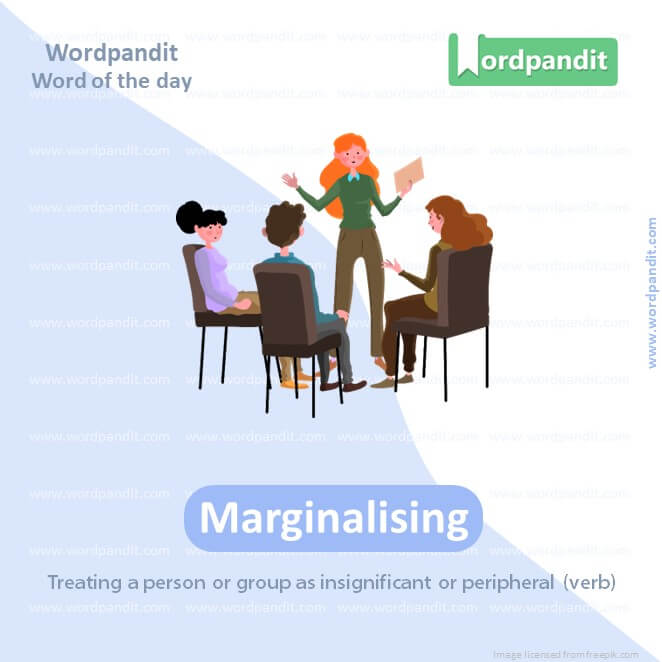
WORD-4: Marginalising
CONTEXT: This linguistic hierarchy perpetuates the perception that political sophistication and intellectual prowess are intrinsically tied to proficiency in English, marginalising the rich cultural tapestry of vernacular expressions.
SOURCE: Indian Express
EXPLANATORY PARAGRAPH: Marginalising is like when someone is not letting a friend join in their games and making them feel left out. It means making someone feel less important or not part of the group.
MEANING: Treating a person or group as insignificant or peripheral (verb).
PRONUNCIATION: MAR-juh-nuh-lie-zing
SYNONYMS: Sideline, Overlook, Disregard, Neglect, Undervalue
USAGE EXAMPLES:
1. The policy risked marginalising certain groups.
2. She felt marginalised at work because of her beliefs.
3. The movie was criticized for marginalising its female characters.
4. Historically, these communities have been marginalised.
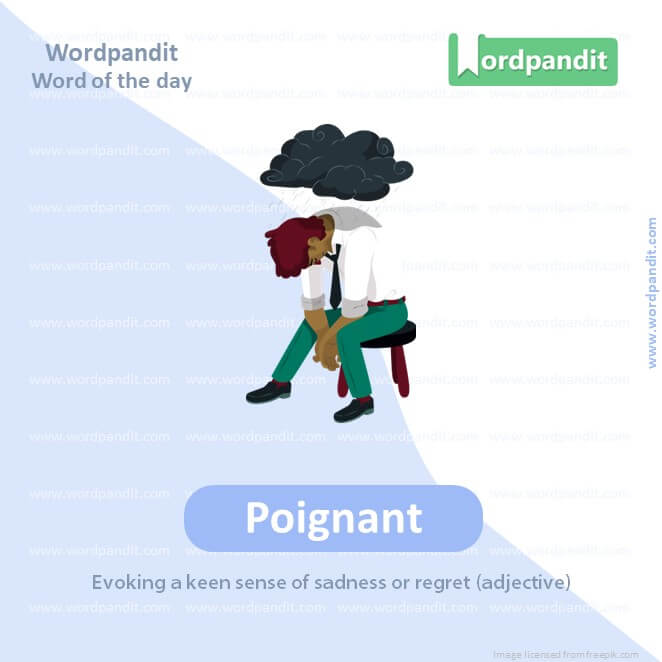
WORD-5: Poignant
CONTEXT: a poignant moment that challenged this linguistic hierarchy.
SOURCE: Indian Express
EXPLANATORY PARAGRAPH: Poignant is like feeling really sad and touched when you hear a story about a lost puppy. It means something makes you feel very emotional, especially in a sad or thoughtful way.
MEANING: Evoking a keen sense of sadness or regret (adjective).
PRONUNCIATION: POYN-yunt
SYNONYMS: Touching, Moving, Sad, Heartfelt, Emotional
USAGE EXAMPLES:
1. The movie had a poignant ending that made everyone cry.
2. His words were poignant and made her think.
3. The poignant music brought tears to her eyes.
4. There was a poignant moment during the ceremony.
WORD-6: Adhered
CONTEXT: This departure from the norm she had adhered to as a public person signalled a shift in political communication, emphasising the need for a more inclusive approach that resonates with a broader spectrum of society.
SOURCE: Indian Express
EXPLANATORY PARAGRAPH: Adhered is like when you stick a sticker on a piece of paper and it stays there. It means to stick to something or follow a set of rules or beliefs closely.
MEANING: Stuck fast to a surface or followed closely (verb).
PRONUNCIATION: ad-HEERD
SYNONYMS: Clung, Stuck, Bonded, Attached, Complied
USAGE EXAMPLES:
1. The label adhered to the jar even after washing.
2. They adhered to the traditions of their ancestors.
3. The paint adhered well to the wall.
4. He strictly adhered to his diet plan.
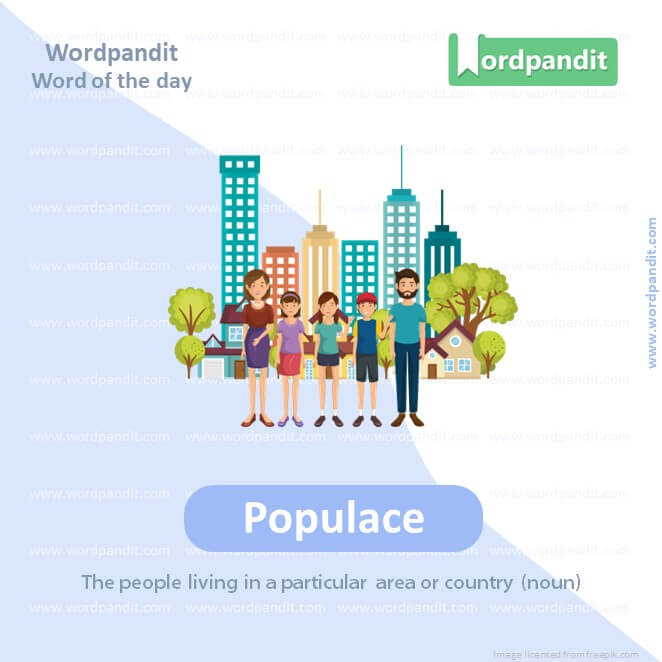
WORD-7: Populace
CONTEXT: the political elite and the diverse linguistic landscape of the Indian populace.
SOURCE: Indian Express
EXPLANATORY PARAGRAPH: Populace is like all the kids in your school. It means all the people who live in a particular place, like a city or country.
MEANING: The people living in a particular area or country (noun).
PRONUNCIATION: POP-yuh-lus
SYNONYMS: Public, People, Citizens, Inhabitants, Residents
USAGE EXAMPLES:
1. The mayor addressed the concerns of the populace.
2. The new law affected the entire populace of the city.
3. The populace voted in the local elections.
4. The health campaign was aimed at educating the populace.
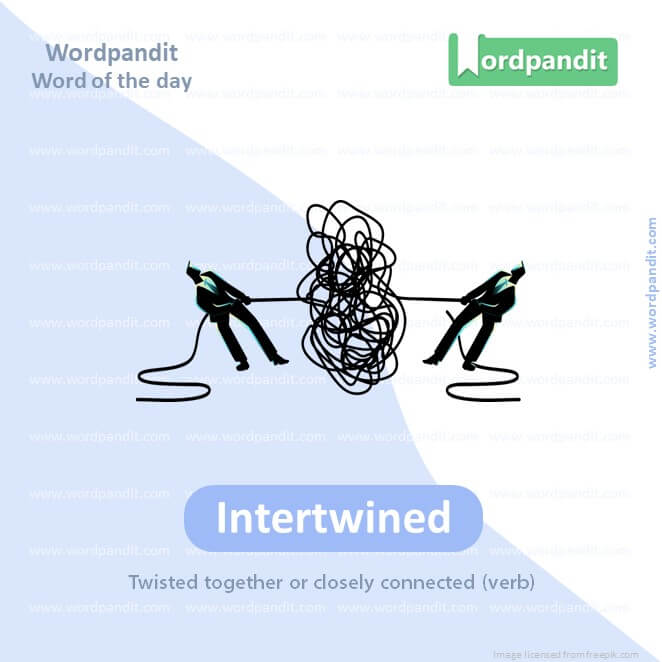
WORD-8: Intertwined
CONTEXT: Language, deeply intertwined with culture, serves as a medium through which individuals express their identity and worldview.
SOURCE: Indian Express
EXPLANATORY PARAGRAPH: Intertwined is like when you twist two strings together until they are connected. It means things are twisted or linked together closely.
MEANING: Twisted together or closely connected (verb).
PRONUNCIATION: in-tur-TWYND
SYNONYMS: Entwined, Interlaced, Twined, Woven, Knitted
USAGE EXAMPLES:
1. The vines intertwined around the tree.
2. Their lives were deeply intertwined.
3. The storylines are cleverly intertwined in the book.
4. Traditions are often intertwined with history.
WORD-9: Enriched
CONTEXT: It is a way of asserting that political sophistication need not be divorced from one’s cultural roots; rather, it can be deeply enriched by them as a matter of more effective communication strategy.
SOURCE: Indian Express
EXPLANATORY PARAGRAPH: Enriched is like making your sandcastle better by adding more sand and decorations. It means to improve the quality or value of something.
MEANING: Improved or enhanced in quality or value (verb).
PRONUNCIATION: en-RICHT
SYNONYMS: Enhanced, Improved, Fortified, Augmented, Amplified
USAGE EXAMPLES:
1. The course enriched her understanding of history.
2. The soil was enriched with compost to help the plants grow.
3. The discussion was enriched by his unique perspective.
4. The library was enriched with new books.
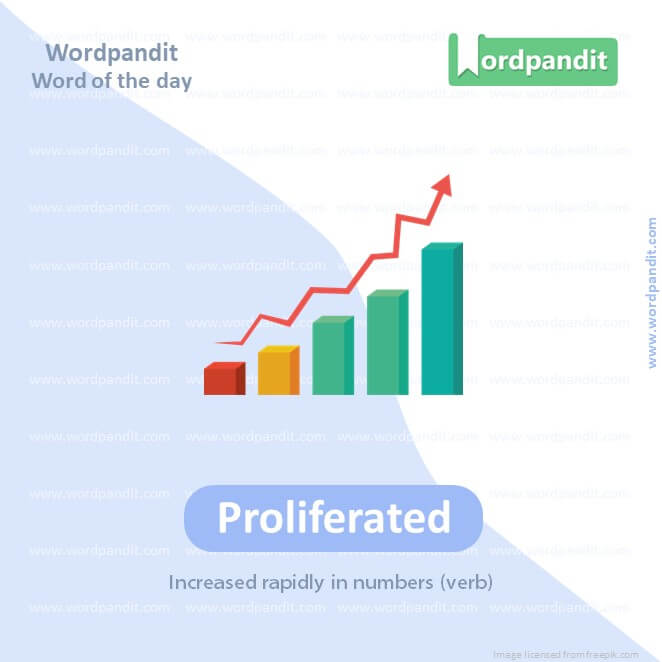
WORD-10: Proliferated
CONTEXT: this reliance on English was carefully built and proliferated by Moitra in her public lectures.
SOURCE: Indian Express
EXPLANATORY PARAGRAPH: Proliferated is like when one tiny flower in your garden turns into lots and lots of flowers. It means to increase a lot and quickly.
MEANING: Increased rapidly in numbers (verb).
PRONUNCIATION: pruh-LIF-uh-ray-tid
SYNONYMS: Multiplied, Spread, Expanded, Escalated, Grown
USAGE EXAMPLES:
1. The number of smartphones has proliferated in recent years.
2. Fake news stories proliferated on social media.
3. The rabbits proliferated in the wild area.
4. During the sale, the crowds in the mall proliferated.
Vocabulary Daily Use
In the fascinating world of language learning, we often concentrate on taking giant leaps, but the real magic lies in the small steps of ‘vocabulary daily use’. These frequently used words and phrases form the backbone of practical communication and understanding. Therefore, mastering ‘vocabulary daily use’ is a crucial element in achieving language fluency.
To effectively learn ‘vocabulary daily use’, one needs to venture beyond the traditional textbook resources. The real essence of these words unveils itself in everyday exposure and interactions. Engaging with a variety of material like novels, magazines, newspapers, podcasts, films and digital content deepens the understanding of ‘vocabulary daily use’. Immersion in these contexts yield natural, everyday language that bridges the gap between the classroom and the real world.
The journey of mastering ‘vocabulary daily use’ necessitates the integration of innovative memory techniques. Flashcards and the Leitner System aid in embedding these words into your long-term memory by promoting active recall. Additionally, the use of mnemonic devices, which allow you to associate ‘vocabulary daily use’ with personal and familiar narratives, can enhance your ability to remember and recall these words.
Moreover, it’s important to remember that ‘vocabulary daily use’ isn’t just about comprehension- it’s about practice and active usage. Incorporate these words in your day-to-day communication and social interactions. This not only solidifies your understanding but also accelerates learning and internalization of ‘vocabulary daily use’.
In a nutshell, mastering ‘vocabulary daily use’ is a continual process that demands exposure, creative learning strategies and assertive practice. The commingling of these tactics brews the perfect formula that allows learners to seamlessly integrate ‘vocabulary daily use’ into their linguistic repertoire. And with that, they can navigate the nuances of language with confidence and ease.













